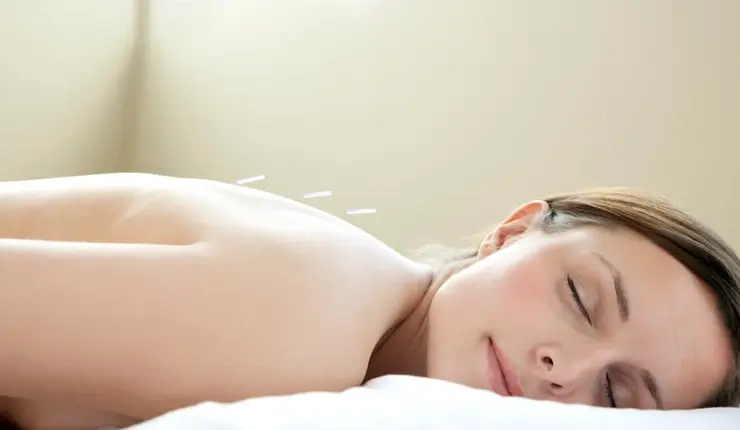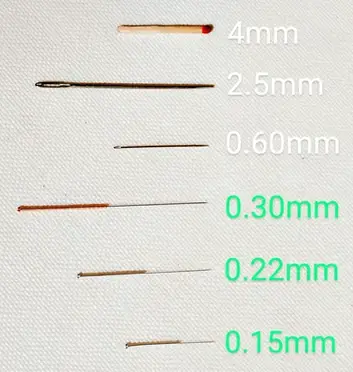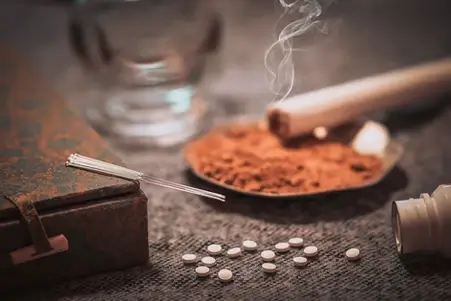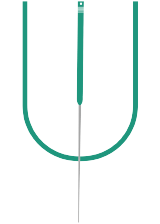One of the most usual phobias of people is the fear of needles.
When I meet someone and they ask what I do, I answer that I am a psychotherapist and an acupuncturist. I like to observe their facial micro-expressions.
The initial interest gives it’s place to hesitation. In some cases even fear.
After that, questions follow, such as, “Does it hurt? Are the needles big?”.
So in this blog, we will answer the most frequently asked questions regarding the needles an acupuncturist uses.

Your most frequently asked questions
1. Does it hurt?
The sensation each person feels from the needles may vary, from tingling to tickling, to numbness, to a pinch. In many cases people don’t even notice when the needle is inserted. Depending on the technique the acupuncturist wants to use, the patient might feel a sensation which in Chinese Medicine is called Deqi. This term describes the moment that the needle comes in contact with the Qi (vital force) of the person receiving the treatment. Precisely to enable this connection between the Qi of the acupuncturist and the patient, the needles we use are not coated with silicone.
2. What size are the needles?

The thickness of an acupuncture needle may indeed vary, depending on the person and the problem they come with. A thinner needle will be used to someone sensitive, old, frail, or when treating a condition related to the spirit and the emotions. On the other side, when a big, muscly athlete enters the room, with pain in their glutes a thicker longer needle might be more appropriate. However, in general, needles used to the body are about 0.18-0.30mm thick and needles used on the face, ears and more sensitive areas are even thinner (0.12-0.16mm).
3. How deeply do they penetrate the body?
According to Chinese Medicine, Qi flows in a specific depth in the body, which varies according to the anatomy. That means that every acupuncture point has a different depth to it. In acupuncture we measure with cuns. A cun is different for every person and has to do with their anatomy. As a general rule, one cun is about the same width as the interphalangeal joint of the thumb (knuckle). ΅When an acupuncturist is using the Primary channels, in most points the needle goes .5 to 1 cun deep.
Of course, depending on the type of channel we use, the depth to which the needle penetrates also changes. For example, when we work on the tendinous channels, the needle only penetrates two millimeters, while when we work on the Luo channels, which we use when the issue we are dealing with is of an emotional nature, the treatment is done with lancets. These needles are only three millimeters long.
4. How long do they stay in for?
Depending on the channel and the technique used by the acupuncturist, the needles can be inserted and removed momentarily or they can remain in the body for 20 or 40 minutes.
5. How does acupuncture work?
This is a very very big question, that needs a very very long answer. But, the main idea is that we all have energy circulating in our body, which the Chinese call Qi. When the Qi is flowing smoothly and is balanced, there is health. When there is stagnation, imbalance, depletion etc, then we have a problem that can manifest in the body, the mind or the emotions. In acupuncture they are all interconnected.
An acupuncturist’s job is to help balance the Qi. To do so they use needles and other skills and techniques.
Bonus: Can I receive acupuncture without needles and with a similar effect?

Yes!
First of all, it needs to be understood that acupuncture is only one of the many skills and techniques a Chinese Medicine practitioner may use in order to bring the patient’s Qi back in balance.
Other skills and tools are acupressure and massage, cupping, Gua sha (a scraping technique) as well as Moxa therapy (the plant artemisia vulgaris, that is rolled into cones and burned on the points, until the heat penetrates the body).
Also, one can draw from the roots of this ancient healing method which are found in Shamanism and activate the channels as the Shamanic healers did then, with the help of their mind in a meditative process.
In this way, healing can be done even remotely with amazing results.
With or without needles, give Chinese Medicine a chance… it is worth it!
Although the needles used in acupuncture are very thin, some people have phobias and others, health conditions that the use of a needle would not be recommended, such as lymph nodes removed or oedema.
If however you feel any doubts concerning the ways that the treatment is being carried out, discuss it with your therapist. It is of great importance that you feel relaxed and pleasant during the treatment at all times.
The benefits that Chinese Medicine has to offer you are great and many in numbers with or without the involvement of needles.
Book now your appointment to find out for yourself.
Book an appointment